Every business is unique, and all marketers know this. How can marketers drive growth for a specific client profile? Account-based marketing (also called signal-based selling) targets a high-value audience, and marketers can implement a systematic account based marketing process with various tactics to meet their needs.
However, if you target accounts in your strategy, your marketing team can become disorganized without the right process. Fortunately, several ABM tools are available. These tools increase efficiency, enhance collaboration, and scale your campaigns.
This guide explores the essential tools for implementing a successful ABM strategy.
Key Takeaways on ABM Tools
- When choosing account-based marketing tools, sales and marketing teams should look for those that enable personalization, increase engagement, and offer analytics.
- Some of the most common types of account-based marketing tools include account targeting, CRMs, engagement features, content tools, advertising, and analytics.
- To find the best account-based marketing tool, start by defining your goals and knowing the features you need. Then, check the integrations it supports and view pricing plans. If you can, find a tool with a free trial or demo.
- There are countless ABM software options, from all-in-one account-based marketing software like 6sense to niche tools like Turtl.
- If you have tried an account-based marketing platform and realized you need an expert team, you can always choose to work with an ABM marketing firm.
TABLE OF CONTENTS:
ABM Tool Requirements
Your signal-based selling tools should reflect everything you need to drive conversions. This can include identifying high-priority accounts, creating personalized marketing campaigns, and aligning sales and marketing teams to maximize account conversion.
ABM tools must:
- Facilitate target accounts: Identify and prioritize accounts based on fit and potential.
- Enable personalization: Creating tailored campaigns for individual accounts.
- Foster engagement: Allow for multi-channel engagement.
- Provide analytics: Measure campaign performance and offer insights for optimization.
When comparing different ABM platforms, you’ll want to choose ones that are:
- Scalable
- Time-saving
- Encourages collaboration
- Can integrate with existing software
- GDPR and CCPA-compliant
- Offers support and training materials
Types of ABM Tools
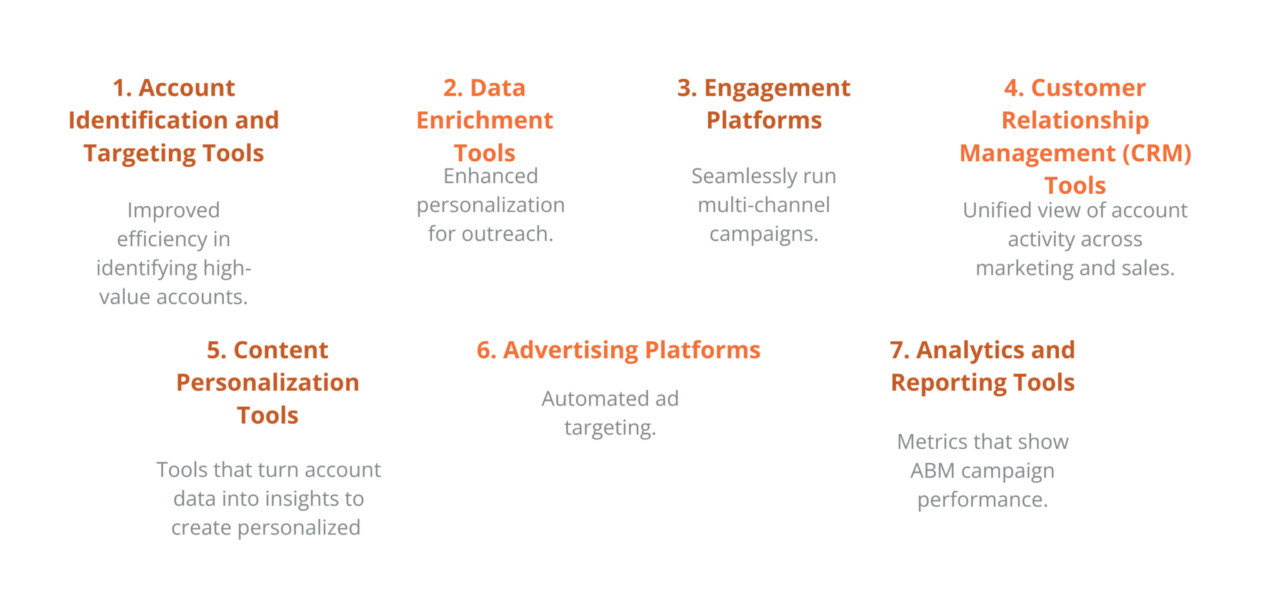
There are various signal-based selling tools available. Fortunately, B2B marketers can separate ABM software into these categories.
Account Identification and Targeting Tools
These tools offer insights into which accounts would be likelier to convert into customers. Account identification tools do this by gauging which target accounts B2B marketers should pinpoint, highlighting factors like industry and business size.
Key features:
- Improved efficiency in identifying high-value accounts.
- Data-driven prioritization based on firmographics and intent signals.
- Fewer marketing dollars are wasted on low-probability prospects.
Data Enrichment Tools
ABM data tools collect information that gauges an account’s purchase readiness, online behavior, buying intent, organizational hierarchies, and competitive behaviors.
Key features:
- Enhanced personalization for outreach.
- Real-time updates on target accounts.
- Insights into decision-making behavior and preferences.
Engagement Platforms
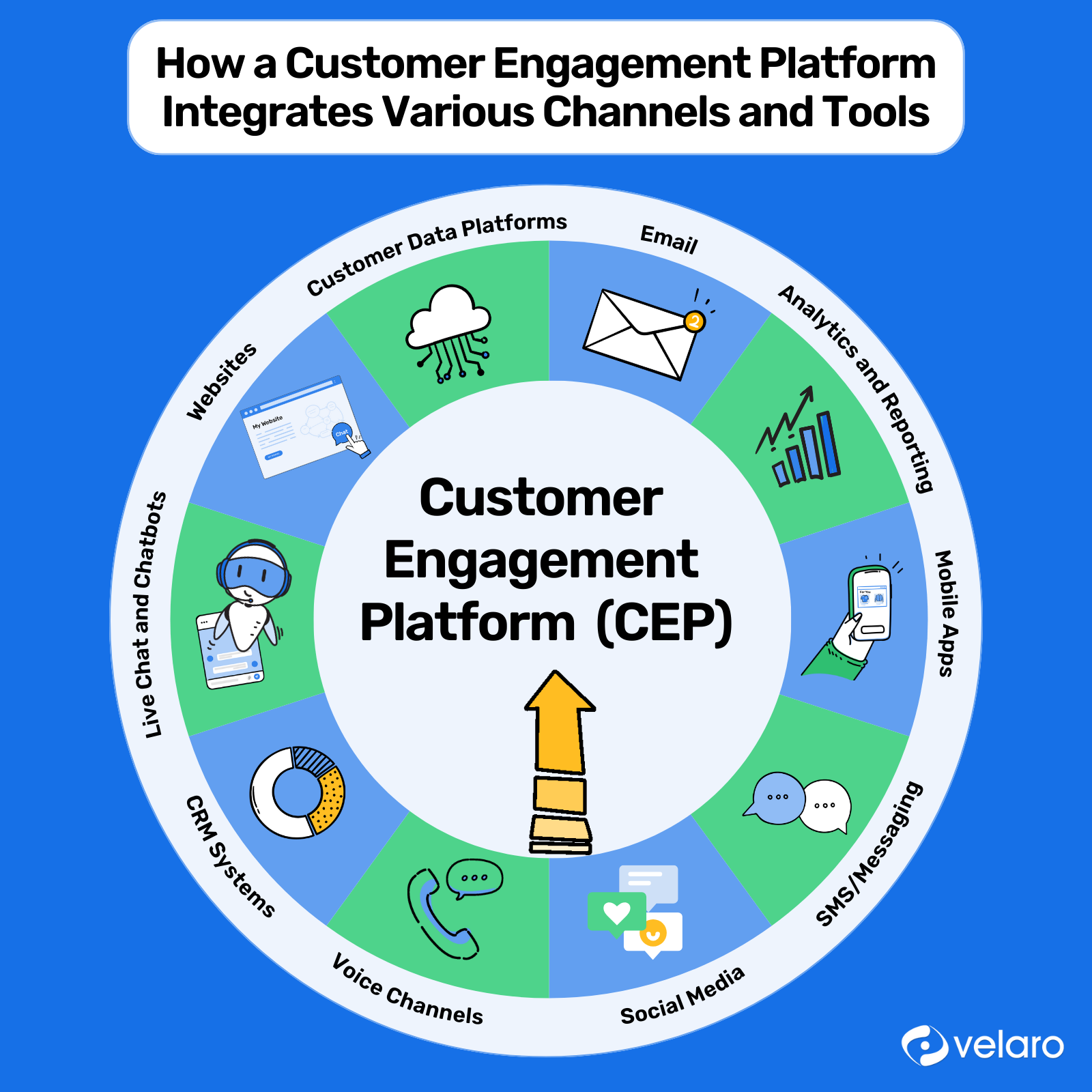
Source: Velaro
Engagement platforms are at the heart of ABM, enabling multi-channel outreach and interaction with accounts. These tools ensure your message reaches the right people through email and social media. ABM engagement platforms also include collaborative features, aligning marketing and sales strategies.
Key features:
- Seamlessly run multi-channel campaigns.
- Personalized content creation.
- Automated workflows.
- Uses innovative outreach methods like gifting.
Customer Relationship Management (CRM) Tools
CRMs offer many functions for ABM marketers, such as managing sales pipelines and gauging the likelihood that an account will convert. These platforms enable seamless collaboration between marketing and sales teams, and your staff can track interactions with accounts and provide insights into the sales journey.
Key features:
- Unified view of account activity across marketing and sales.
- Real-time updates on account interactions.
- Data centralization for cross-functional collaboration.
Content Personalization Tools
This software allows marketers to create and distribute content in one place. ABM content tools can include a CMS where marketers can create content workflows, schedule postings, and measure campaign effectiveness.
Personalization is the core of this strategy for creating ABM content. Personalization tools ensure your messaging resonates with each account’s unique needs and challenges.
Key features:
- Tools that turn account data into insights to create personalized content.
- Metrics to track which content resonates most with each account.
- Faster sales cycles by addressing specific pain points directly.
Advertising Platforms for ABM
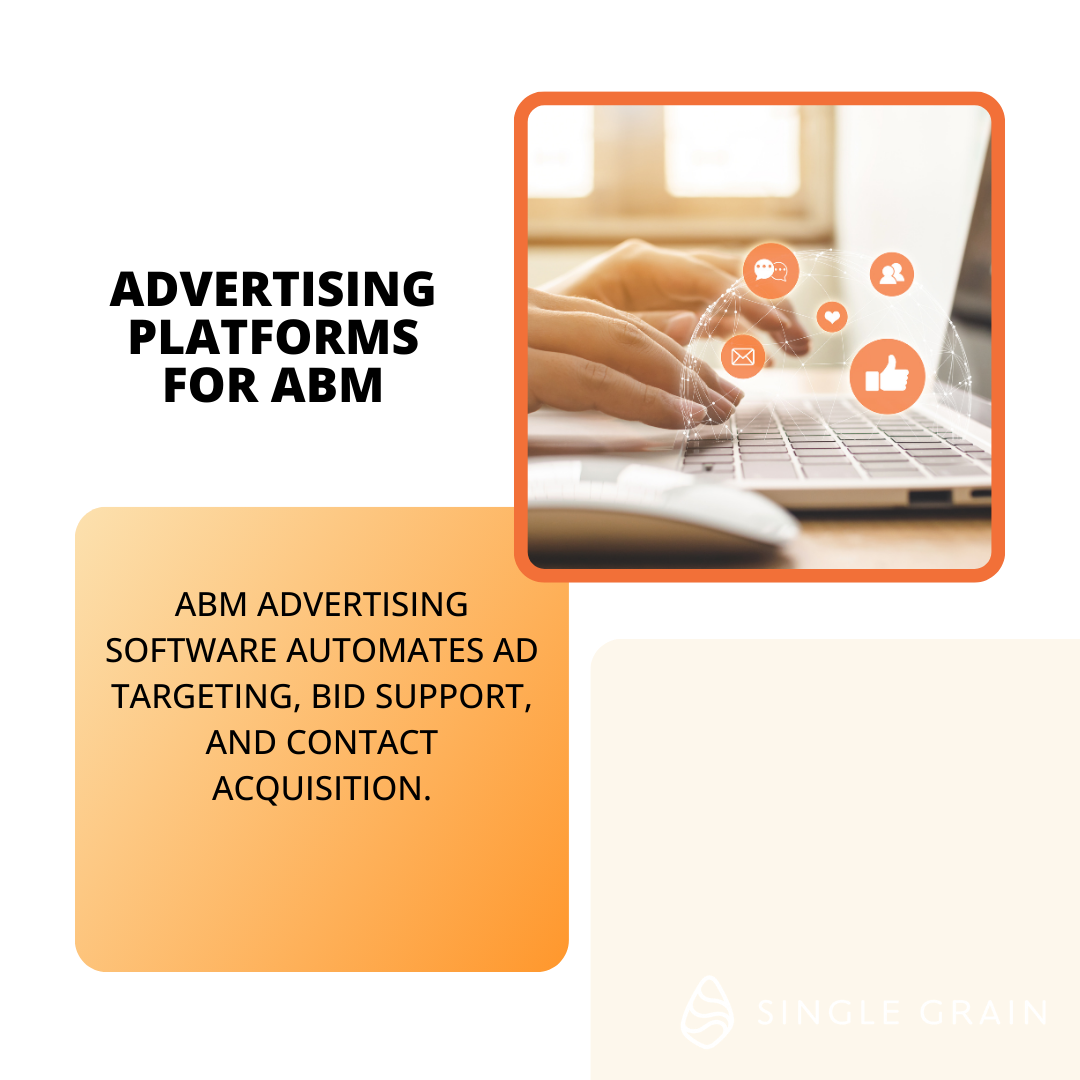
ABM advertising software automates ad targeting, bid support, and contact acquisition. When engaging target accounts, ABM ad tools offer personalization features to deliver highly targeted ads based on specific personas and customer profiles. These platforms leverage account lists and intent data for precise ad placements.
Key features:
- Automated ad targeting.
- Efficient ad spend with bid support.
- Insights into ad performance for specific accounts.
Analytics and Reporting Tools
Measuring the success of ABM efforts is critical to ensure you’re converting target accounts. Analytics tools track engagement metrics, pipeline contributions, and ROI.
Key features:
- Metrics that show ABM campaign performance.
- Measure ROI for accounts or campaigns.
- Data-driven decision-making for campaign optimization.
Selecting the Right Tools for Your ABM Strategy
Choosing the right ABM tools depends on your budget, team size, and campaign complexity. For companies with limited resources, it’s crucial to prioritize tools that offer the best ROI and integrate seamlessly with existing systems.
We’ll cover our favorite ABM tools in the next section. In the meantime, read these tips to ensure you choose the best one:
- Define objectives: Identify your ABM goals, whether they involve generating new leads, nurturing existing accounts, or upselling to current customers.
- Know the features you need: While some ABM platforms will have similar features, like AI-driven insights, other ABM tools are more niche. Decide on the best features for your campaign, such as personalization, multi-channel engagement, and/or real-time reporting.
- Integrations: Ensure the ABM software you choose integrates with your existing platforms, such as your CRM and SEO tools.
- Start small: For companies with limited budgets, consider using free or low-cost tools that address your most pressing needs.
- Leverage trials and demos: Test tools to ensure they align with your workflows and deliver value.
Our Top 12 ABM Software Recommendations
There are countless ABM tools, and narrowing your list can be difficult. Here are some of the best ABM platforms, their features, and who would benefit from them.
1. Karrot
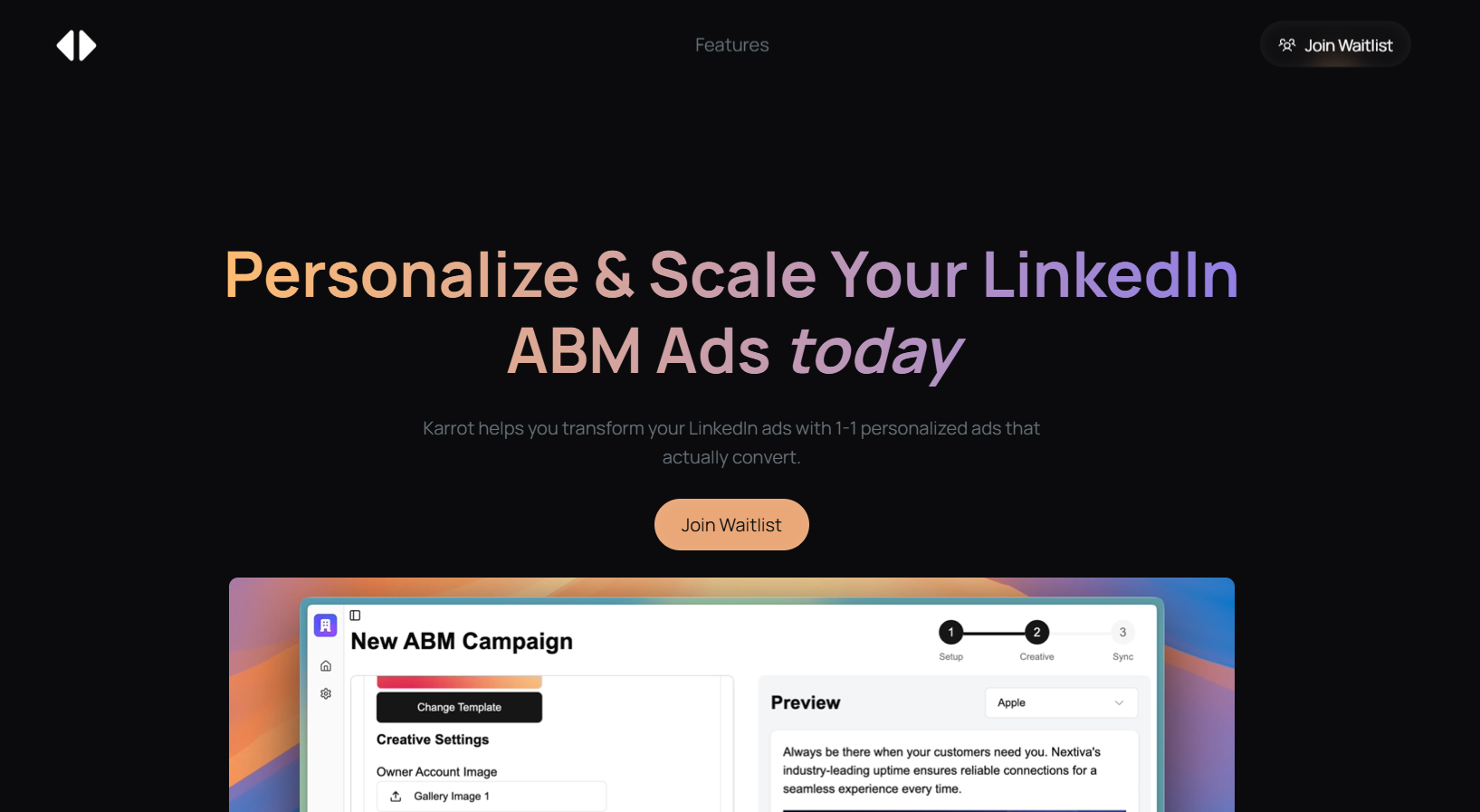
Karrot is an account-based marketing (ABM) platform designed to help businesses engage high-value target accounts with marketing, advertising, and landing pages.
This tool streamlines the ABM process by combining data insights, campaign automation, and performance tracking in a single platform. Marketers can set specific accounts when creating a campaign, and Karrot can generate unique audience insights from these accounts.
Karrot enables teams to deliver tailored content and coordinate cross-channel campaigns for maximum impact. Advertisers can create ad campaigns and creatives in one place. Karrot integrates with various ad platforms so advertisers can engage accounts on several platforms.
One of Karrot’s best aspects is that it automates all these functions. Sourcing the data for several accounts and creating hyper-targeted campaigns is time-consuming, but Karrot can create ad strategies for various accounts in minutes. With robust analytics, users can track engagement, optimize strategies, and measure ROI effectively.
It’s important to note that Karrot, right now, is just for ABM campaigns on LinkedIn. You can join the wishlist to get a demo of the tool.
2. 6sense
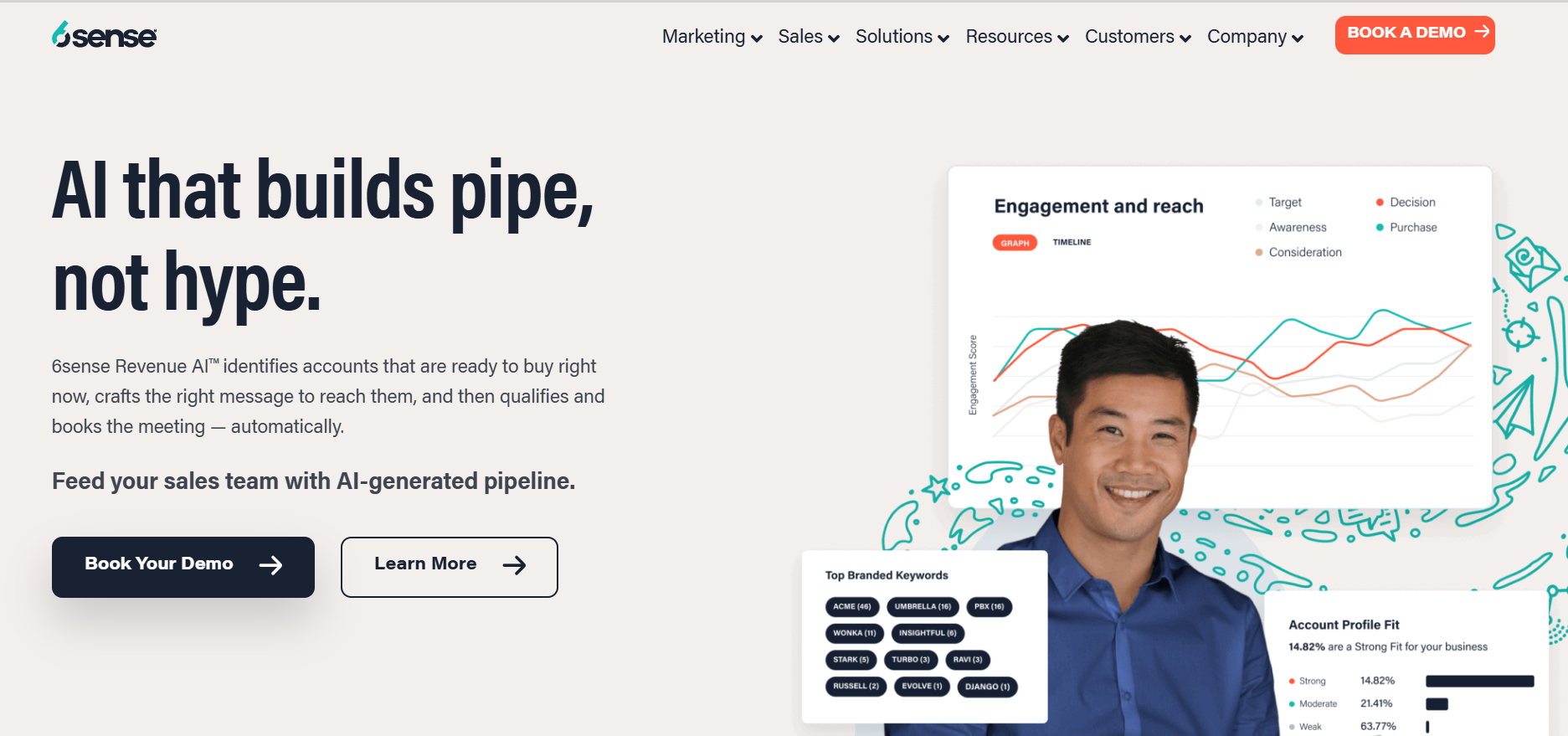
If your marketing and sales team is looking for an all-in-one platform, 6sense is your best choice. 6sense is an AI-driven account engagement platform that empowers businesses to achieve their revenue goals by uncovering buyer intent and optimizing marketing and sales efforts.
It leverages predictive analytics and intent data to identify high-value accounts, reveal buying behaviors, and inform you when they’re nurtured enough to convert.
With 6sense, teams can deliver personalized, timely experiences across marketing and sales channels, driving higher conversions and revenue. The platform integrates seamlessly with CRMs and marketing automation tools, providing a unified view of customer journeys. Additional features that 6sense offers include campaign planning, data synchronization, and account segmentation.
3. Demandbase
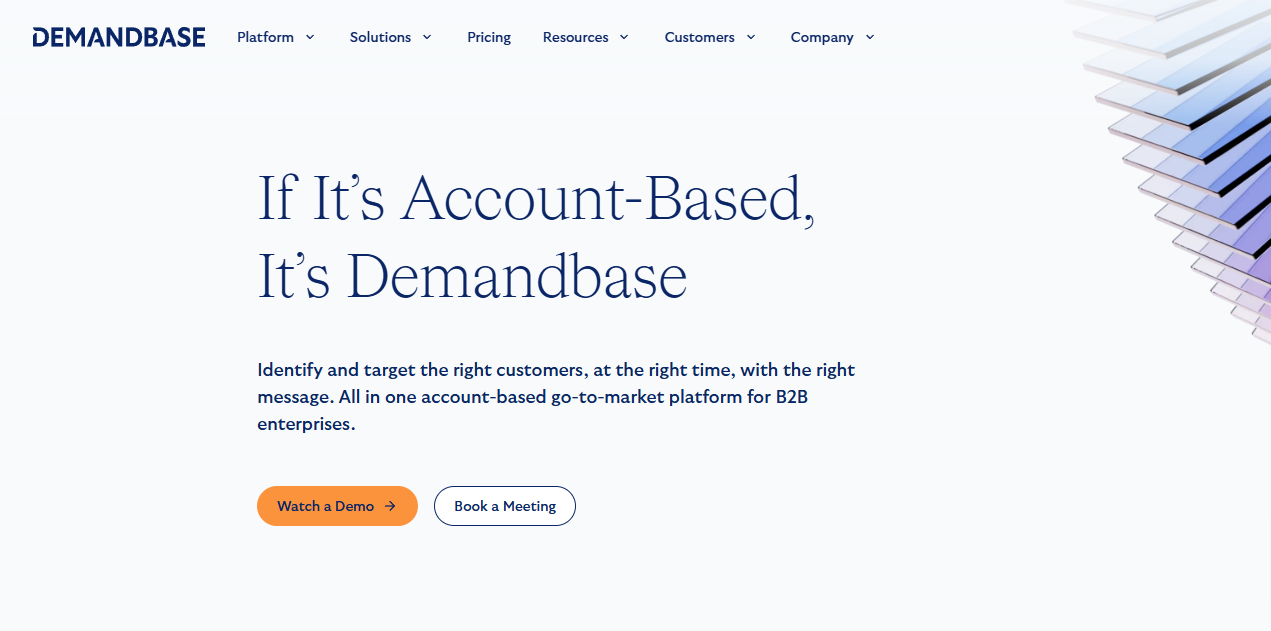
Demandbase is a leading marketing and advertising platform designed to convert high-value accounts. It combines account intelligence, intent data, and AI-driven insights to deliver personalized experiences across the sales funnel. This platform uses automation to uncover high-value accounts by analyzing past customer conversations and social media activity.
Demandbase uses predictive analytics to predict trends and catch opportunities before they occur. Its various integrations ensure streamlined workflows and consistent customer interactions.
4. ZoomInfo
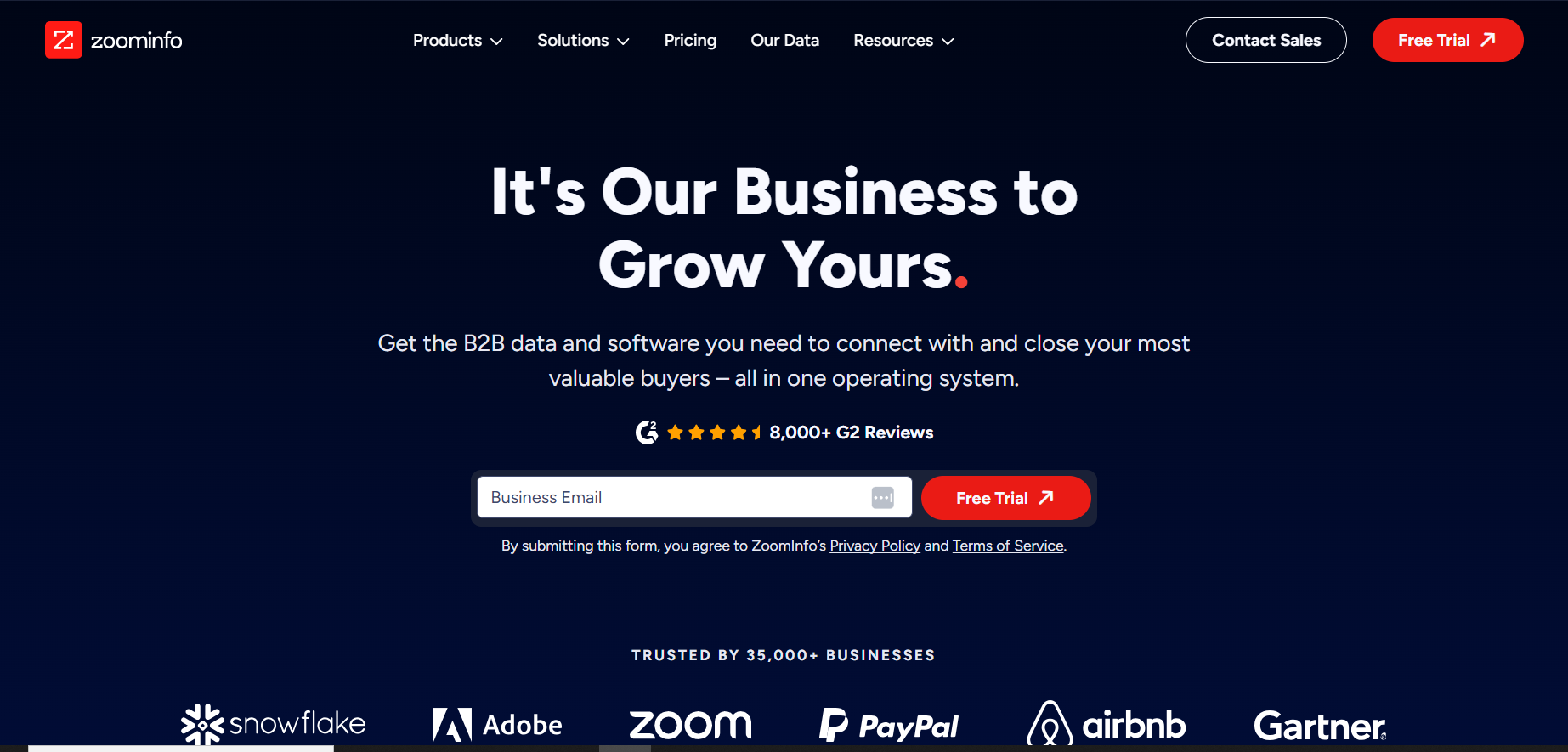
ZoomInfo is a platform that offers updated information on various companies and their contacts, enabling organizations to identify and connect with their ideal prospects.
ZoomInfo combines firmographic, technographic, and intent data with advanced analytics to deliver actionable insights for targeted outreach and personalized engagement. The platform integrates seamlessly with platforms like Microsoft Dynamics 365 and Oracle so that sales teams can target their accounts down every sales funnel stage.
5. ClearBit
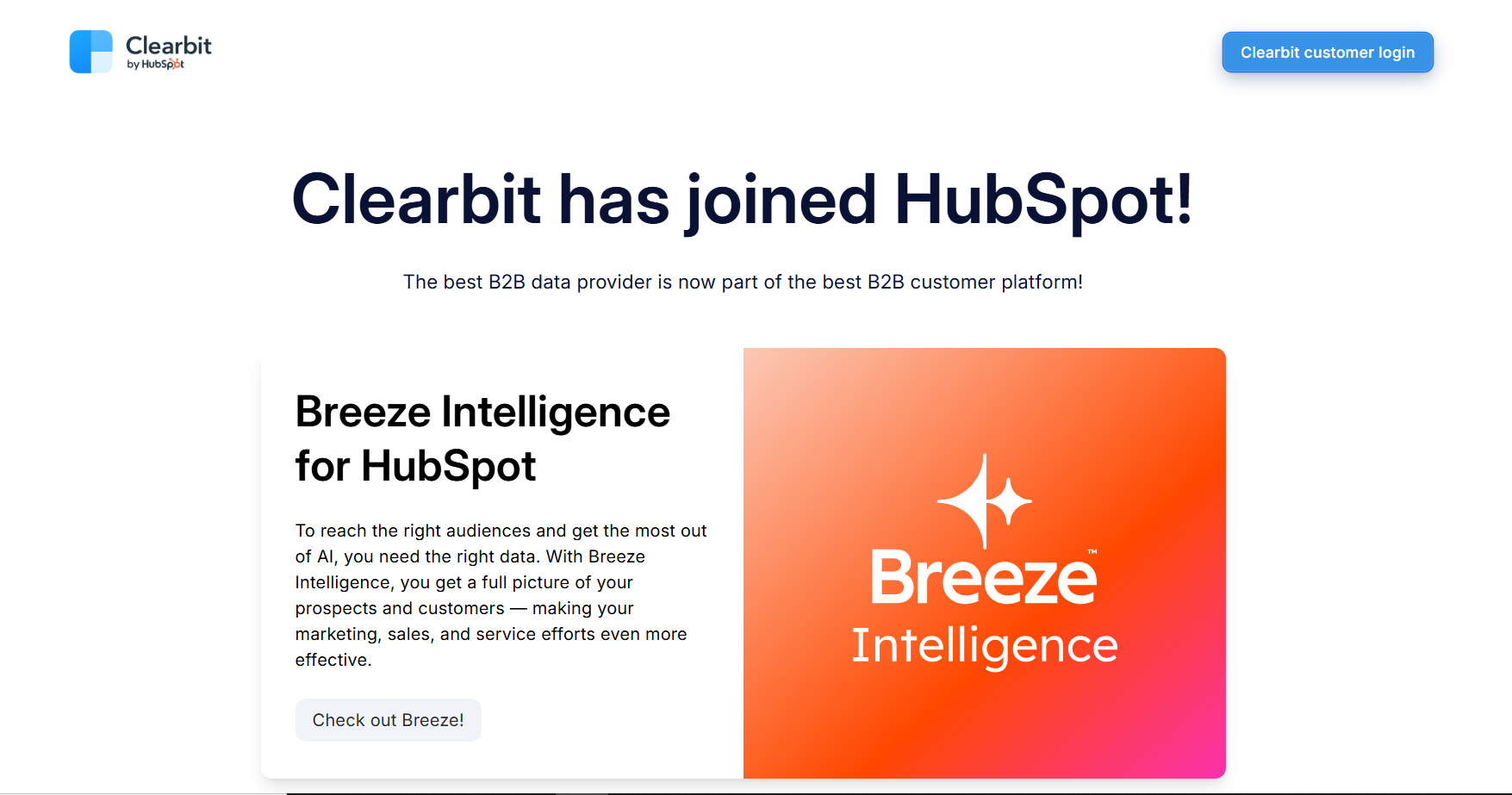
Clearbit is a data enrichment platform that provides actionable insights about companies and individuals. This results in precise targeting to prioritize high-value leads in a marketing strategy.
Clearbit integrates seamlessly with platforms like Drift to deliver real-time data on prospects, including firmographics, technographics, and contact information. Its APIs and integrations empower businesses to automate lead scoring and form optimization processes.
6. Lusha
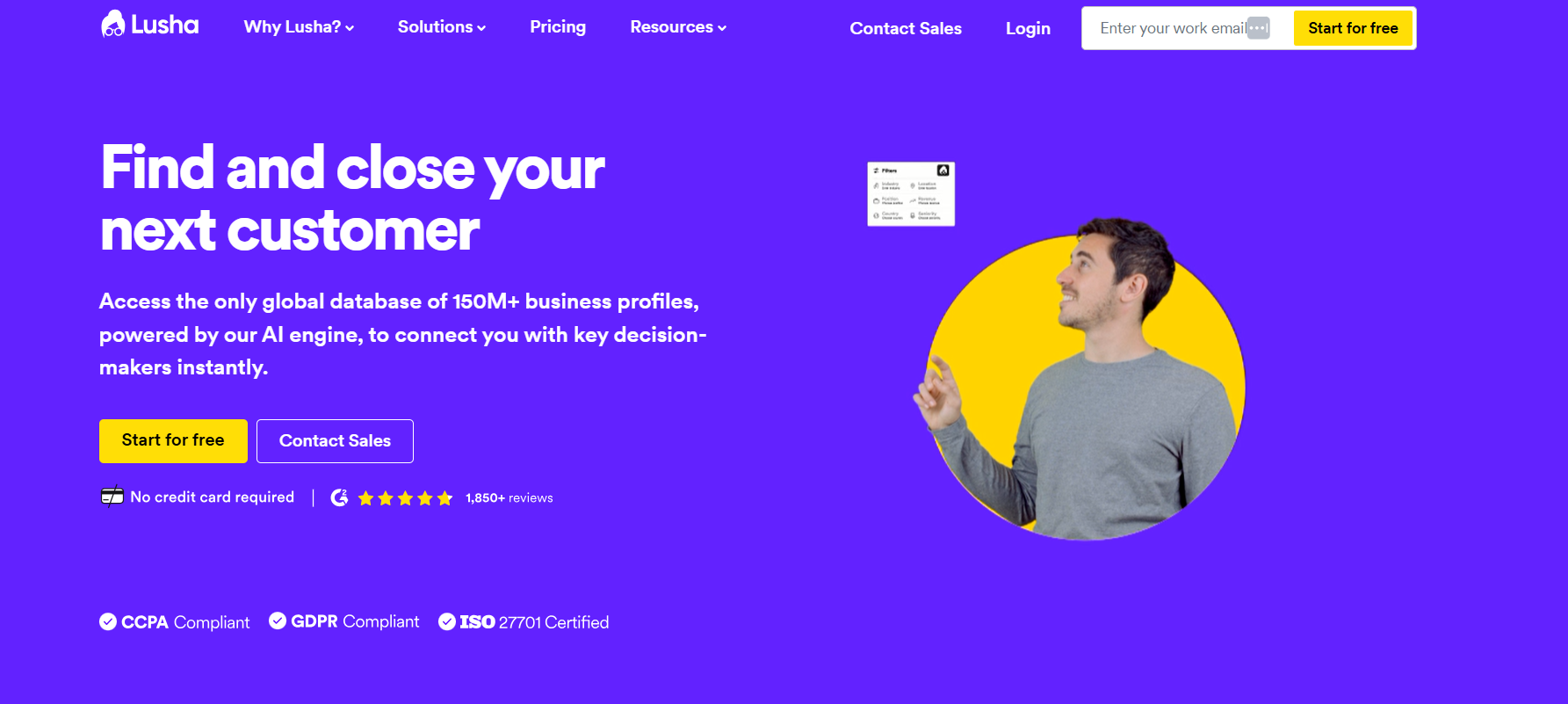
Lusha is a leading B2B contact and data platform that can bulk up your existing CRM. It provides direct access to firmographics and contact details such as email addresses and phone numbers, helping teams connect with decision-makers efficiently.
Lusha integrates seamlessly with the biggest CRMs and sales tools, such as HubSpot and Salesforce, streamlining workflows and enabling faster lead qualification and prospecting.
With a strong focus on data accuracy and compliance, Lusha ensures ethical and effective outreach. Its intuitive interface and rich database make it ideal for an account-based marketing strategy, driving higher conversions and accelerating revenue growth.
7. Marketo
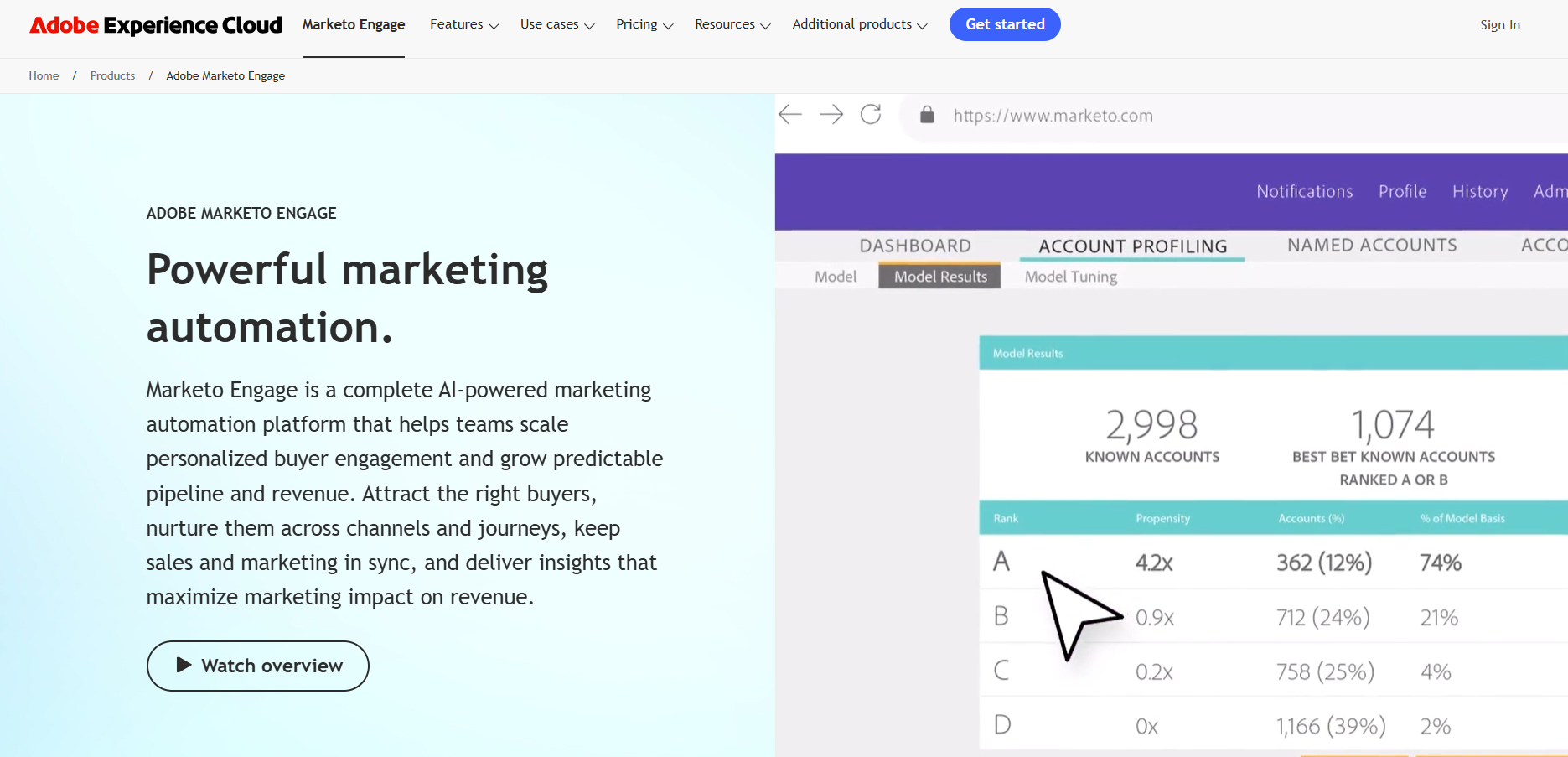
Marketo, an Adobe company, is a leading marketing automation platform designed to help businesses streamline and optimize their marketing efforts.
It automates lead scoring to find the best accounts for your brand. To nurture these leads, Marketo offers tools for email marketing, customer engagement, and campaign management, enabling marketers to deliver personalized experiences at scale.
Marketo integrates seamlessly with various ad platforms and sales tools like Outreach, offering a unified view of customer journeys for sales reps. Its robust analytics and reporting features help measure campaign performance, gauge revenue, track your pipeline, and report KPIs like ROI.
8. Sendoso
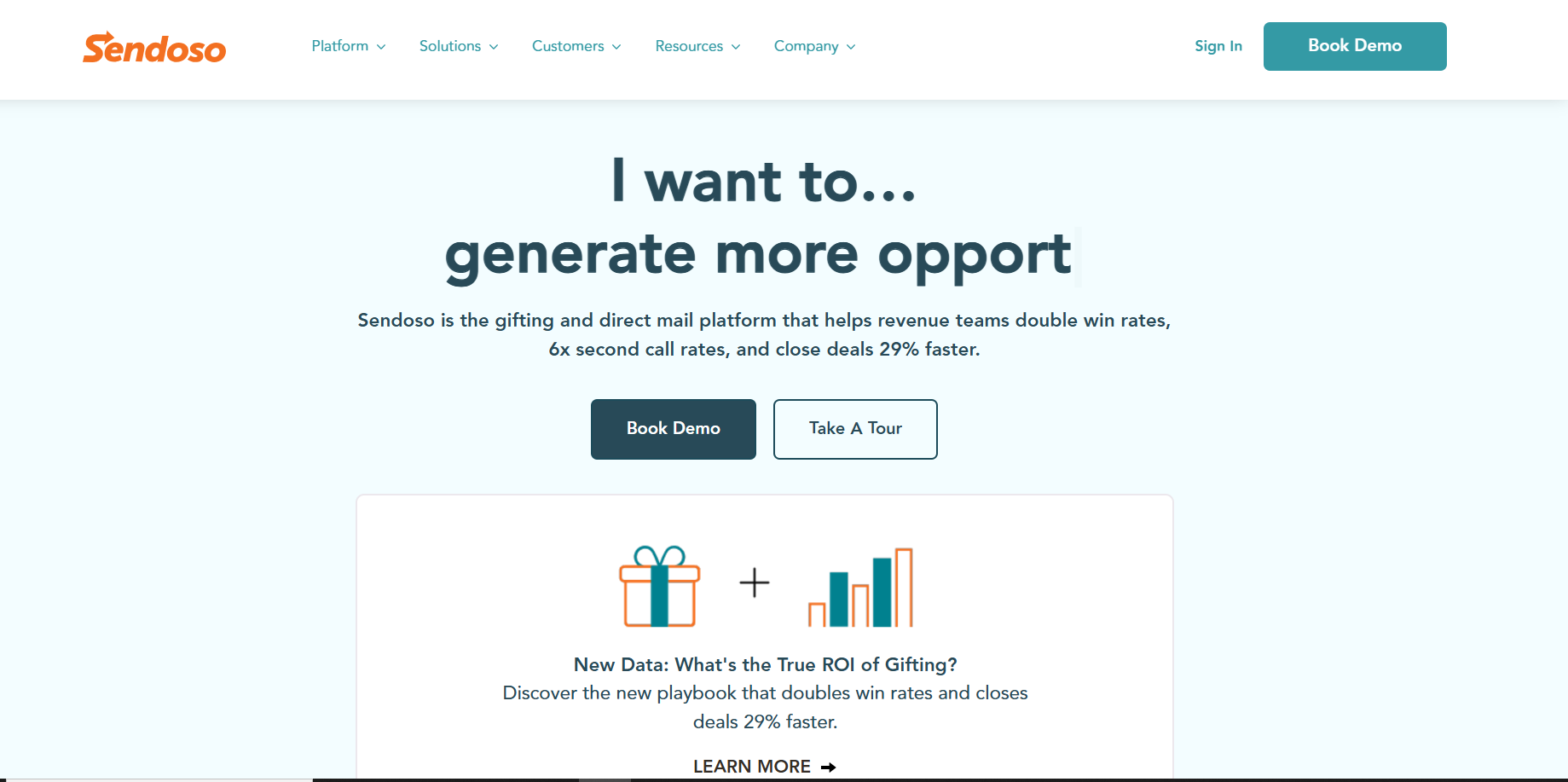
Personalized gifts are a great way to connect with accounts, and Sendoso is one of the best platforms for eGifts and branded goodies.
By integrating with marketing platforms like Marketo, Sendoso simplifies the process of sending gifts and digital incentives. It enables teams to effectively create meaningful connections, boost response rates, and nurture relationships. Plus, you can send limitless gifts. Sendoso has a global fulfillment network that allows you to send gifts to recipients worldwide.
9. Pipedrive
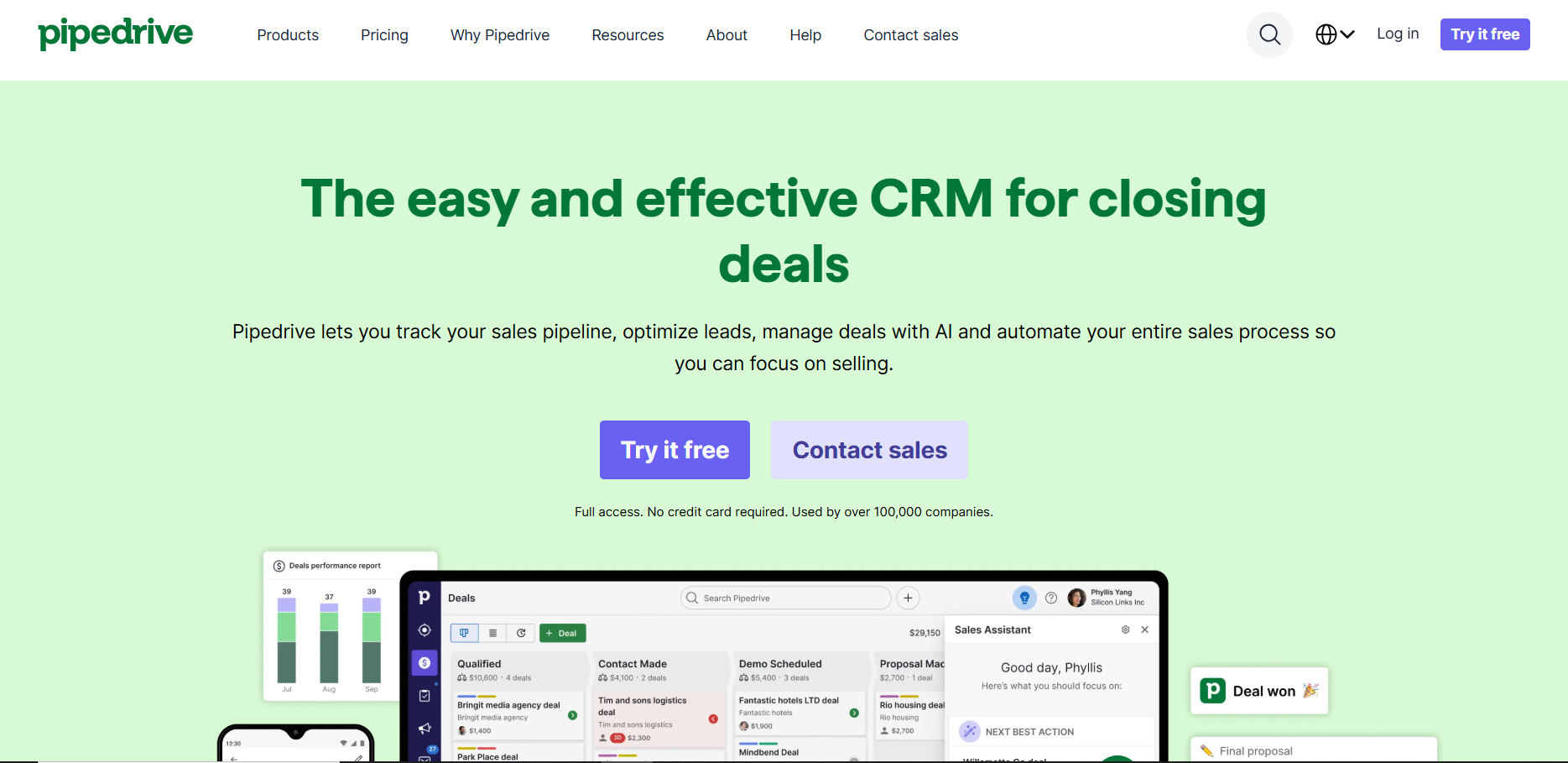
Pipedrive is a user-friendly customer relationship management (CRM) platform optimized for the sales pipeline. The platform visualizes the sales pipeline, offering customizable workflows, detailed reporting, and robust integration capabilities with other tools like email, marketing automation, and calendar apps.
Pipedrive also has an intuitive and customizable interface for managing sales in one place. It automates routine tasks, like follow-ups and lead capture, so sales professionals can focus only on closing leads.
Pipedrive’s AI-driven insights and analytics help teams make data-driven decisions, optimize performance, and close deals faster. It’s ideal for businesses of all sizes looking to streamline their sales processes, improve collaboration, and accelerate revenue growth through efficient pipeline management.
10. PathFactory
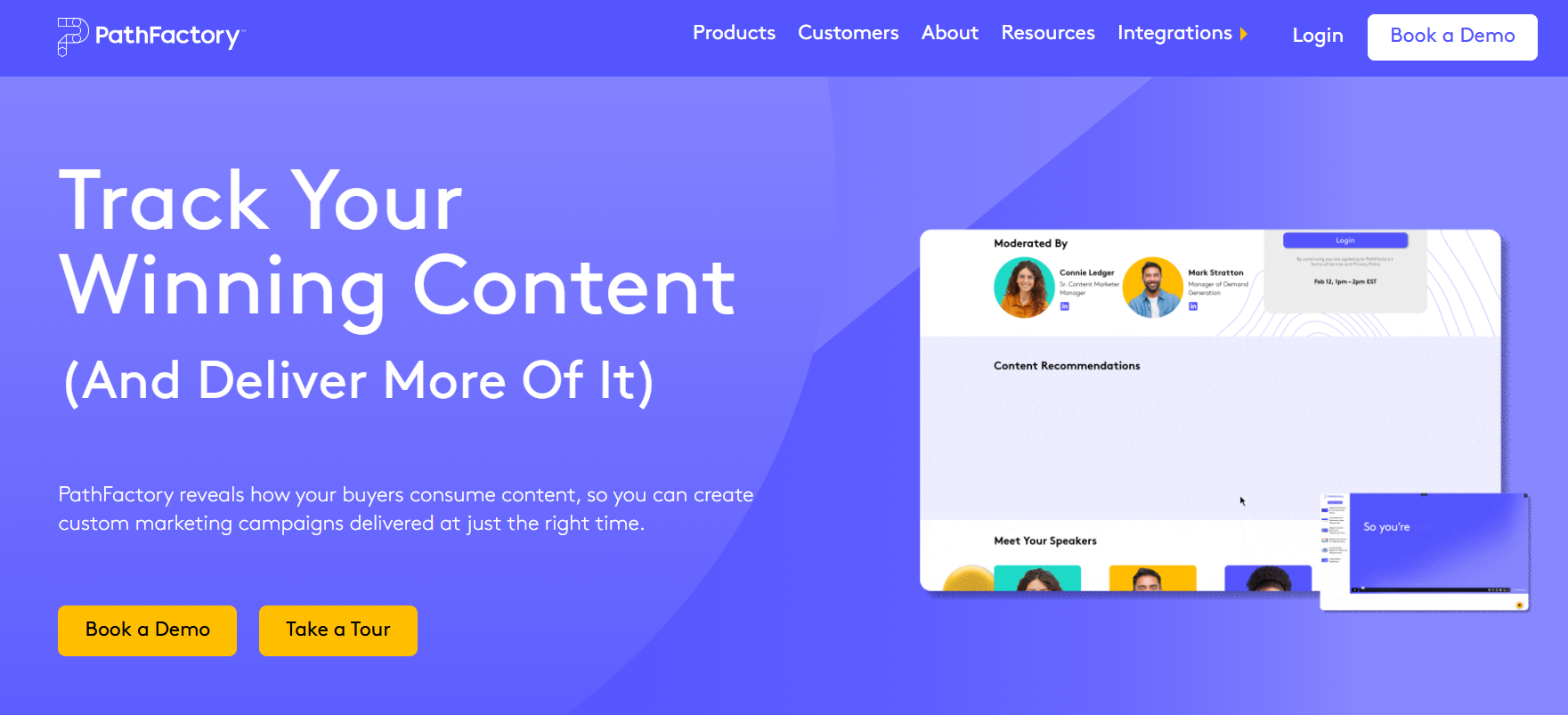
PathFactory is a content intelligence platform where B2B marketers can deliver targeted content to accelerate buyer journeys. It leverages AI to analyze audience behavior, recommending the most relevant content for each prospect in real-time. PathFactory offers analytics, such as session engagement data so that content creators can make data-driven decisions.
If you store account data in Google Analytics or a similar platform, you can integrate that tool into PathFactory to create more personalized content. Marketers can nurture leads effectively, shorten sales cycles, and drive measurable revenue growth.
11. UberFlip
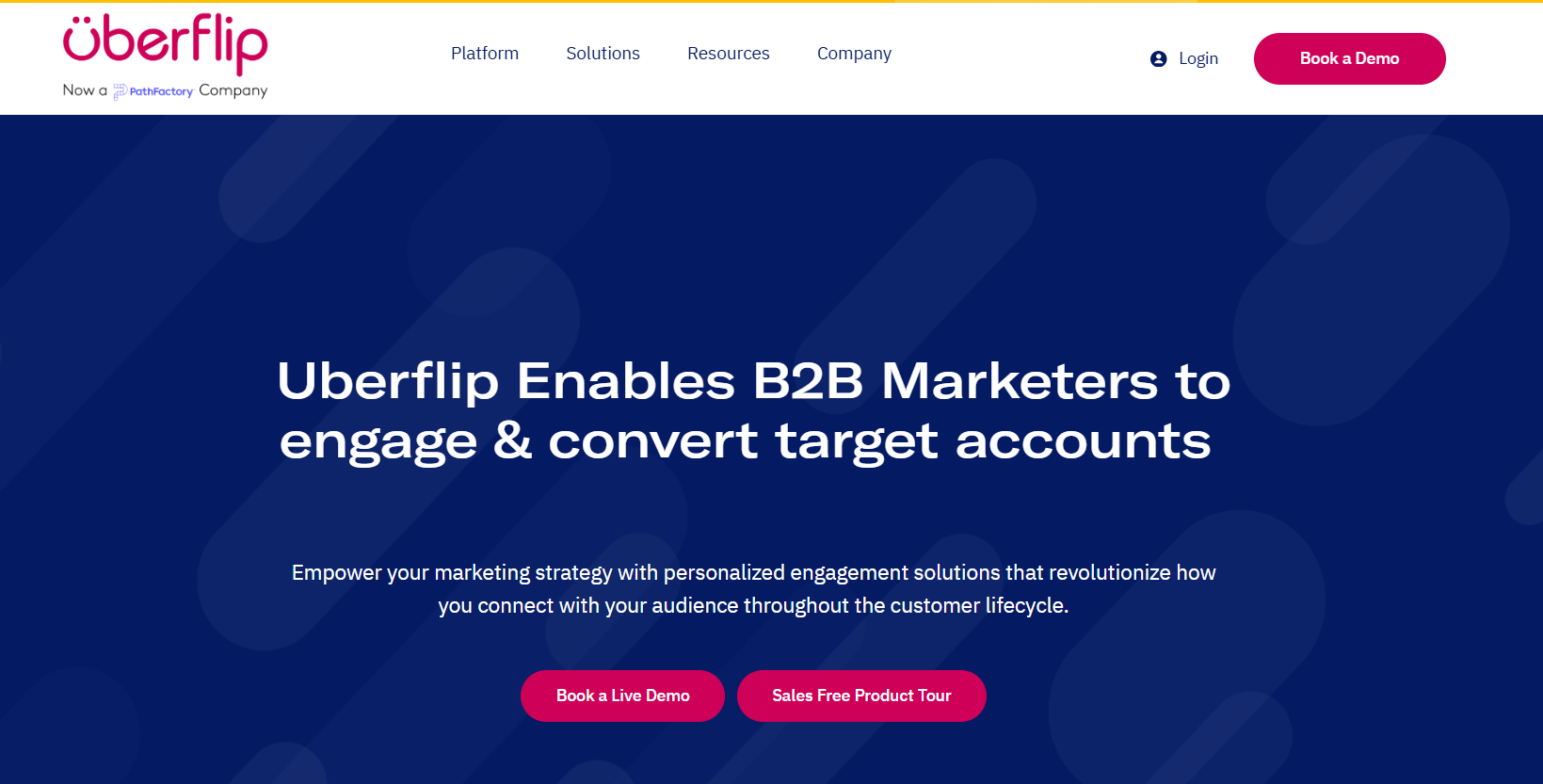
Personalized content is integral to converting accounts, and there’s no better personalization platform than UberFlip. Setting up a content campaign on UberFlip is simple. Teams can centralize their content, curate tailored experiences, and deliver them across multiple channels to accelerate buyer engagement.
In addition to content marketing, UberFlip supports inbound marketing, demand generation, customer engagement, and sales engagement. Its robust analytics provide insights into content performance, so content creators always know how to nurture their accounts.
12. Turtl
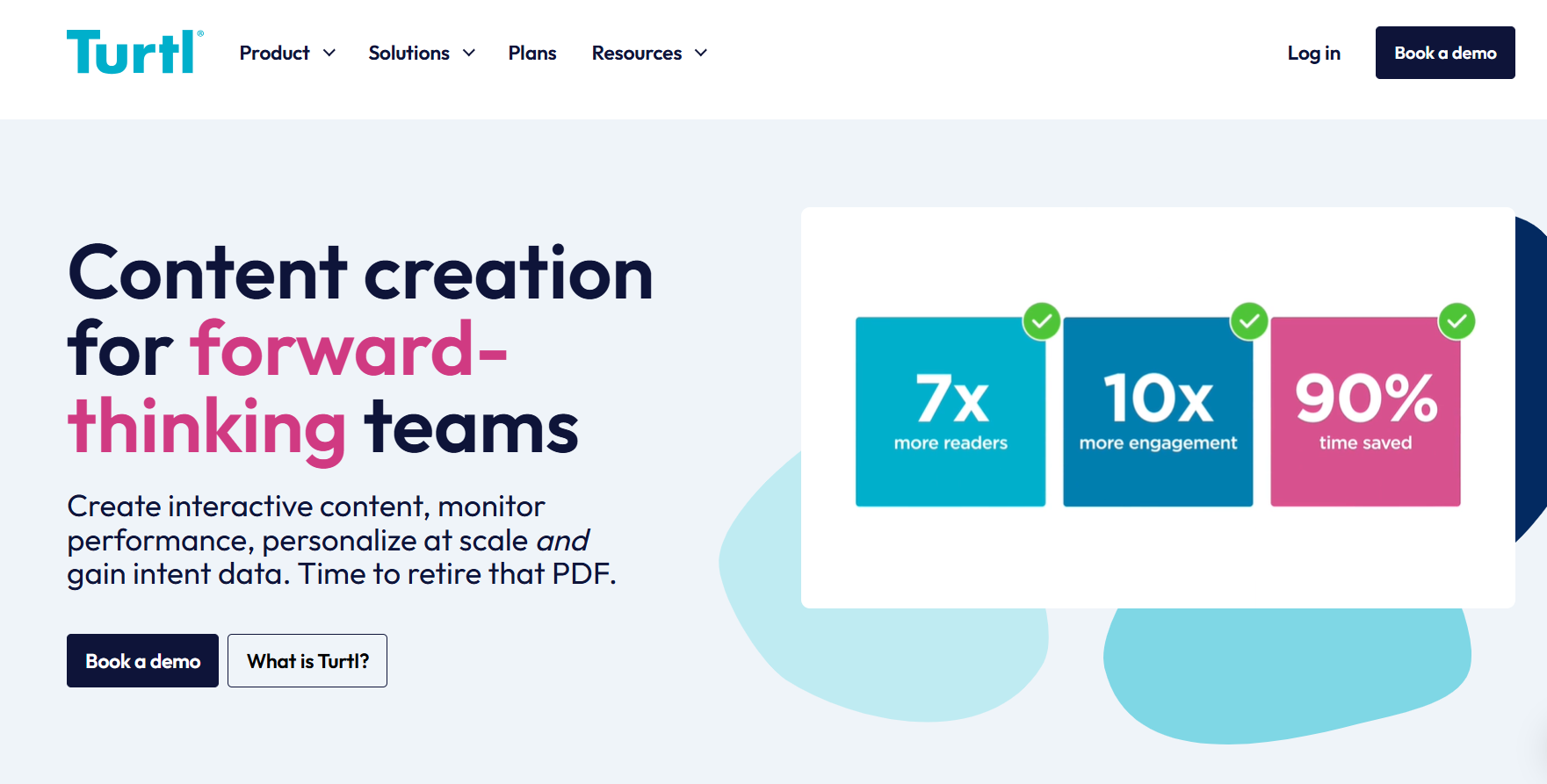
Turtl is a content creation platform that helps businesses produce engaging, data-driven digital documents to capture audience attention and drive results.
It transforms traditional static content, like PDFs, into interactive, visually appealing experiences optimized for online consumption. Turtl integrates with marketing and email automation platforms like Unbounce to reach your accounts on multiple channels.
Turtl’s intuitive interface allows users to create and customize materials such as brochures, reports, and whitepapers without design expertise.
Its built-in analytics provide detailed insights into reader behavior, enabling marketers to tailor personalized content for accounts.
Working With an ABM Marketing Firm
While there are countless high-quality ABM tools, brands should consider working with an account-based marketing (ABM) firm. An ABM firm can elevate your B2B marketing efforts by providing expertise in targeting high-value accounts and delivering personalized campaigns.
ABM firms specialize in aligning sales and marketing, identifying ideal customer profiles, and leveraging data to create tailored strategies. These agencies will work with your internal team to find high-value accounts and create a campaign that better targets them.
Your ABM marketing firm will likely use these advanced account-based marketing tools and analytics to prioritize leads, craft compelling content, and execute multi-channel campaigns.
Start Converting Accounts With These ABM Tools
B2B marketers must target the highest-quality accounts to increase revenue and improve ROI. Several ABM tools offer all signal-based selling marketing tactics in one place, while other platforms offer niche solutions.
Investing in the right combination of tools can transform your marketing efforts, ensuring that every dollar spent delivers maximum impact.
If you tried ABM tools and didn’t get the results you wanted, you can always work with an account-based marketing firm. You’ll work with a team of experts who know the best strategies to convert your accounts so you can experience long-term growth.
If you’re ready to level up your account-based marketing strategy, Single Grain’s ABM experts can help!👇
Related Video
For more insights and lessons about marketing, check out our Marketing School podcast on YouTube.
Frequently Asked Questions About ABM Tools
-
What are ABM tactics?
Account-based marketing (ABM) tactics are strategies designed to target and engage high-value accounts. These tactics prioritize quality over quantity, building meaningful relationships with key decision-makers and influencers within a target account. Some examples of ABM tactics include creating offers specific to accounts, personalized content, and ad retargeting.
-
How do ABM campaigns differ from other types of marketing?
Account-based marketing (ABM) campaigns differ from traditional marketing approaches in focus, execution, and measurement. Traditional marketing takes a one-size-fits-all approach to attracting prospects, while ABM applies personalization to each account.
-
What are ABM tools?
Account-based marketing (ABM) tools are specialized software platforms that help businesses implement and optimize their ABM strategies. These tools focus on identifying, targeting, engaging, and nurturing high-value accounts through personalized marketing efforts. ABM tools can automate many processes in sales and marketing campaigns, saving time and money.
-
What's the best tool for ABM beginners?
ZoomInfo, Sendoso, and Clearbit are the best account-based marketing software for beginners. These platforms are easy to use and don’t require advanced expertise.
-
What are the best ABM metrics to track?
ABM metrics focus on engagement and sales. The best metrics to track include engagement rate, customer retention, progression rate, account reach, overall revenue, ROI, and brand awareness.






